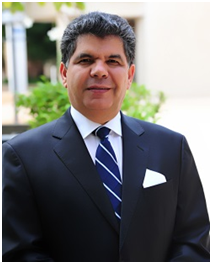
|
|
|
Keynote Speakers Professor Belaid Aouni
College of Business and Economics, Qatar University. Doha 2713, Qatar.
Email: belaid.aouni@qu.edu.qa
Some Epistemological Considerations of the Goal Programming Model
Abstract: The Goal Programming (GP) is the most known model of the multi-objectives programming tools. This model is continually fed with theoretical developments and new applications with resounding success. It is a distance function model that aggregates simultaneously several conflicting and incommensurable dimensions where the deviations between the achievement and the aspiration levels are to be minimized. Considering several dimensions enhances the legitimacy of studying the decision-making problem from different aspects and facets. In fact, the GP model is based on a satisfying philosophy where the Decision-Maker rationality is bounded and the obtained recommendation (solution) is the one of the best compromise that fits with his/her value system and preferences. Despite that the GP model is not a pure axiomatic model but it does respect the general principals of mathematical modeling. The aim of this paper is to look at the GP model epistemological dimensions and to highlight its contribution to the multi-criteria decision aid paradigm.
Belaïd Aouni is the Associate Dean for Research and Graduate Studies and full professor at the College of Business and Economics, Qatar University. He was a professor at the School of Commerce and Administration and past Director of the School of Commerce and Administration at the Faculty of Management, Laurentian University (Canada). He was also the Vice-Dean for Research at the Faculty of Management and an Acting Dean of the Faculty of Graduate Studies at Laurentian University. He is the recipient of Laurentian University 2010 Research Excellence Award and the 2012 Teaching Excellence Award; he is also the recipient of 2005 Canadian Operational Research Society Service Award. He received a B.Sc. in Production and Operations Management from Tlemcen University (Algeria), an M.B.A. and a Ph.D. in Management Science/Operational Research from Laval University (Quebec, Canada). Dr. Aouni’s teaching and research interests are related to the areas of multiple objective programming and goal programming, multiple criteria decision aid, mathematical programming, production planning and control, and supply chain and logistics management. Dr. Aouni has served as President of the Canadian Operational Research Society. His publications have appeared in top-tier journals such as Journal of Operational Research Society, European Journal of Operational Research, Annals of Operational Research, Journal of Multi-Criteria Decision Analysis, Journal of Global Optimization, Information Systems and Operational Research, Applied Mathematics and Computation and International Transactions in Operational Research. He is member of the Editorial Board of the International Journal of Portfolio Analysis and Management. He serves/has served as a reviewer and guest editor of many of journals in the field of Management Sciences.
.................................................................................................................................................................................................................................
 Professor Mohsen ElHafsi
School of Business Administration. University of California-Riverside, USA.
Email: melhafsi@ucr.edu
Management of Assemble-to-Order Processes: An Optimal Control Approach
Abstract: Assemble-to-order (ATO) systems consist of multiple components that are assembled into a variety of end-products whereassembly takes place only after information on customer orders is received.ATO production has been apopular strategy for manufacturing firms that seekto be both responsive and cost effective since itenables a firm to shorten its response timeto its customers by staging inventory of componentsahead of demand while postponing the final assemblyuntil demand materializes andthe decision on what components to purchase/produce must be made well before demand materializes.This strategy is particularlyvaluable when component supply leadtimes arelong or the supply processes are capacitated.Most of the research dealing with ATO systems focuses on determining agood component procurement/production policycombined with component inventory allocation policy in order to minimize system-wide costs.
In this talk, we discuss the optimal production and inventory control of several ATO systems wherecomponents are produced in a make-to-stock fashion;component production times are exponentially distributed with finite production rates; components are stocked ahead of demand and therefore incur a holding cost rate per unit. Demand for end-products occurs continuously over time according to independent Poisson streams; and any demand, for a particular end-product, that cannot be fulfilled immediately, is lost (backordered) and incurs a lost sales penalty (backorder cost) per unit lost (backordered). A control policy specifies when to produce each component and whenever an order is placed, whether or not to satisfy it from on-hand inventory or backorder it.We formulate the problem as a Markov decision process and characterize the structure of the optimal policy. We show that the optimal component production policy is a state-depend threshold type known as base-stock policy.We also show that the optimalinventory allocation for each component is a state-dependent rationing policy with different rationing levels for differentdemand classes or end-products. Further, we discuss several heuristic policies that are good substitutes for the optimal policy. Key words: Dynamic Programming, Assemble-to-order, Production/Inventory Management, Markov Decision Process, Markov Chains Short Bio:
Mohsen ElHafsi is a renowned researcher in the field of Operations and Supply Chain Management. His research focuses on the design and management of complex and global supply chains. He is currently professor in the School of Business Administration at the University of California-Riverside. He is Area Coordinator of the Operations and Supply Chain Management group. He was Associate Dean of Graduate programs, distinguished Fulbright fellow and Visiting Professor at the Ecole Centrale de Lille in France. He is the author of numerous articles. His papers have been published in leading journals including Management Science, Operations Research, Naval Research Logistics, IIE Transactions, European Journal of Operational Research, Production and Operations Management among others. He is FKF Honor Graduate of the University of Florida with a Ph.D. and M.Sc. degrees in Industrial and Systems Engineering. He received the “Ingénieur Principal” degree, with high honors, from the Ecole Nationale d’Ingénieurs de Tunis in Tunisia.
|

